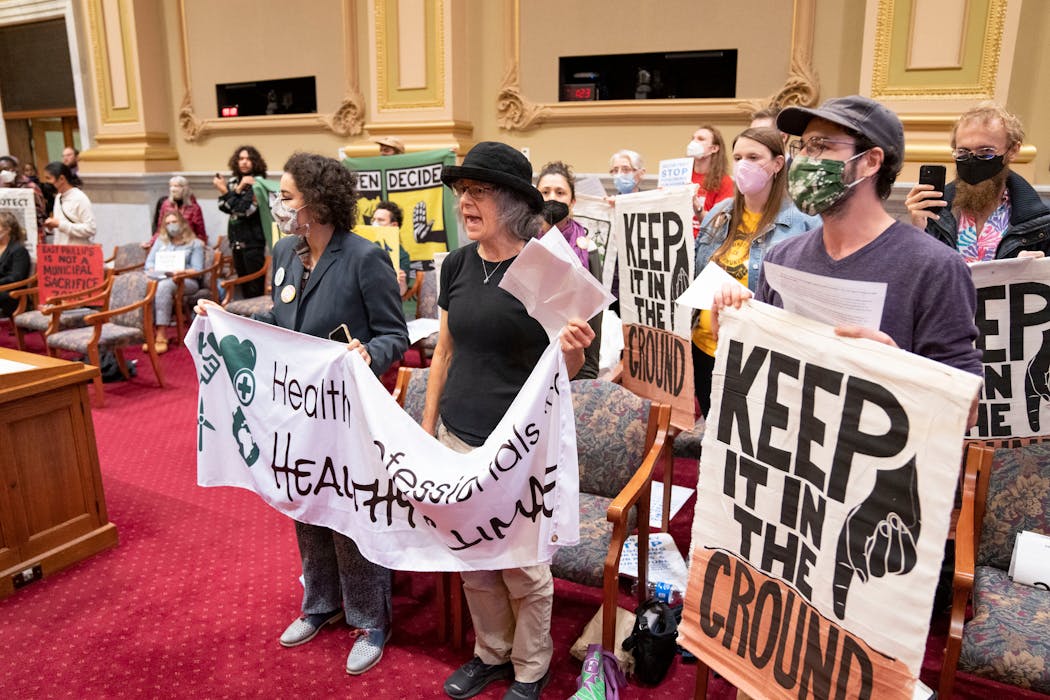Dozens of environmental activists from the East Phillips neighborhood of Minneapolis repeatedly disrupted Thursday's meetings of the Minneapolis City Council over a vote to issue a request for proposals to demolish the former Roof Depot warehouse.
Singing and drumming over council members, protesters demanding the vote be delayed forced Council President Andrea Jenkins to adjourn the morning meeting and reconvene in the afternoon. Council members ultimately voted 7-4 to issue the RFP as protesters shouted, "We will not be silent," "This is what democracy looks like," and "How can you conduct a meeting right now? This is not OK!"
Council Members Jenkins, LaTrisha Vetaw, Michael Rainville, Lisa Goodman, Jamal Osman, Emily Koski and Linea Palmisano voted for the RFP. Jason Chavez, Robin Wonsley, Elliott Payne and Aisha Chughtai voted against. Andrew Johnson abstained.
After the meeting, Mayor Jacob Frey criticized the protesters as "anti-democratic" for trying to prevent the council's vote.
"Our government, it depends on the ability to conduct business," he said. "Council members need to be able to make a decision."
The vacant Roof Depot warehouse at 1860 28th St. E. is the subject of a yearslong fight between neighborhood activists who want to save it for an urban farm and the city, which plans to tear it down and build a centralized Public Works facility for the storage of water maintenance equipment and vehicles.
Demolition of the building has been a sticking point.
City staff say it is too run-down to preserve. Activists say they have not gotten enough details from the city's geotechnical consultant on the project, Braun Intertec, about how the demolition and remediation would be done without polluting the neighborhood because there is an arsenic plume beneath the warehouse.
Three scheduled meetings between East Phillips activists and Braun Intertec have been canceled, said Karen Clark, a former legislator and community organizer.
"We are very concerned about the plan to demolish Roof Depot without adequate prevention of arsenic recontamination to the area," she said. Meeting with Braun Intertec "was a promise made by the mayor in negotiations, and they're not living up to it."
Clark said the city has recently removed hundreds of protest signs that East Phillips residents had previously stuck to the fence surrounding the warehouse and started to move in concrete barriers. Neighbors fear demolition is just around the corner, she said.
Just before the council's vote, Koski attempted to explain why she was voting yes, but she was interrupted and unable to finish.
"The intention was to hold a meeting prior to demolition, which is still the intention and not a reason to delay," she said, emphasizing that any proposal for demolition services resulting from the RFP would still need to return to committee and receive approval from the City Council and mayor before actual demolition. "There is no path in front of us that includes the preservation of the Roof Depot building, and I will not sit here and be dishonest with the East Phillips community."
The city has offered East Phillips' urban farm advocates exclusive development rights to 3 acres of the Roof Depot site at no cost in return for dropping an environmental lawsuit and allowing the city to proceed with building its Public Works facility.
The City Council and mayor have offered a memorandum of understanding that includes promises to work with the Pollution Control Agency to conduct an analysis of the project's environmental risks, cap the number of vehicles that would travel daily to and from the Public Works site and provide the community with education on lead exposure and reducing air pollution. Community activists have not yet signed the memorandum, which would require them to drop their lawsuit.

Want to share info with the Star Tribune? How to do it securely

'Safe recovery sites' would offer syringes, naloxone and more to people using drugs. The plan could be in peril.
New Minnesota GOP leaders seek peace with party's anti-establishment wing

Who is Republican Lisa Demuth, Minnesota's first House speaker of color?



